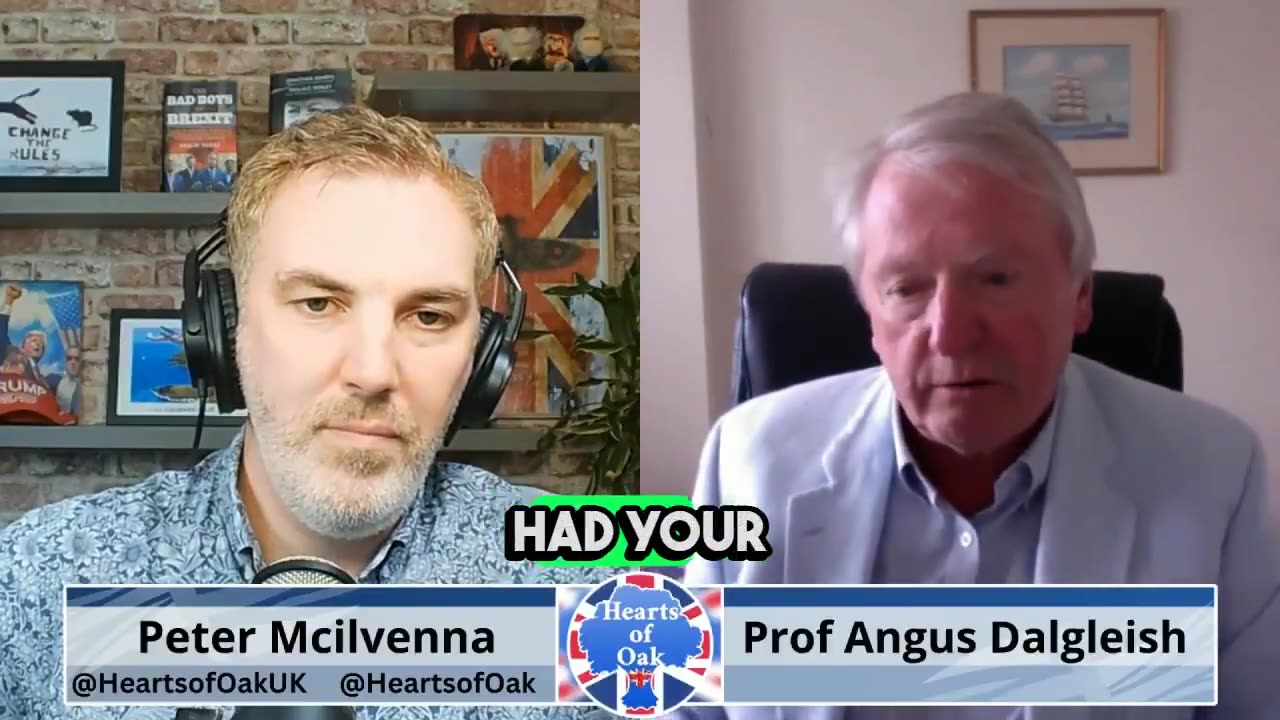Premium Only Content

Dr. Angus Dalgleish Unveils Vitamin D's Critical Role in Cancer Treatment Success
Dr. Angus Dalgleish, a leading oncologist, has revealed a startlingly simple yet overlooked factor in cancer treatment success: vitamin D levels. Over 15 years ago, during early immunotherapy trials using low-dose interleukin-2 and immune stimulants, Dalgleish and his team noticed a stark divide. Some patients responded remarkably well, while most did not. The burning question was: why?
The answer was astonishingly straightforward. With the advent of reliable, rapid vitamin D assays, the team discovered that patients with robust vitamin D levels responded brilliantly to immunotherapy, while those with low levels saw little to no benefit. By correcting vitamin D deficiencies, Dalgleish’s team dramatically improved response rates. “The data is that black and white,” he says.
This revelation extended beyond immunotherapy. Dalgleish cites his colleague, Dr. Daniel Von Hoff, a renowned pancreatic cancer trialist in the U.S., who initially scoffed at the vitamin D connection. Three months later, Von Hoff called back, stunned. After reviewing records, he found that no pancreatic cancer patients responded to chemotherapy if their vitamin D was low. His team began correcting vitamin D levels, and outcomes improved.
Armed with this evidence, Dalgleish and senior colleagues approached the UK’s National Institute for Health and Care Excellence (NICE) over 15 years ago, urging them to mandate vitamin D testing and correction before starting cancer treatments. Low vitamin D, they argued, sabotages not just immunotherapy but also chemotherapy. NICE’s response? A dismissive promise to consider it in their “five-year plan.” Fifteen years later, vitamin D testing remains a mere footnote in nutritional advice, not a standard of care.
Dalgleish is scathing about this inaction. He calls NICE and similar organizations “inappropriately named” and accuses their leaders of being out of touch, more interested in costly, toxic drugs from big pharma like Pfizer than in cheap, non-toxic solutions like vitamin D. “They might as well talk to keepers at the zoo,” he quips, highlighting their disconnect from the patient-clinician interface.
The implications are profound. Dalgleish sees patients who’ve failed chemotherapies and immunotherapies, only to find their vitamin D levels “in the boots.” He insists no patient should begin treatment—whether chemotherapy or immunotherapy—without first correcting vitamin D deficiency. The evidence is overwhelming, yet the system lags behind.
This isn’t just a medical oversight; it’s a failure of leadership. Dalgleish argues the NHS and organizations like NICE have a duty to prioritize affordable, effective interventions that can save lives. Vitamin D is cheap, safe, and vital for immune response and treatment success. Why, then, is it ignored while expensive, marginally effective drugs dominate?
It’s time for change. Patients deserve better. Clinicians should demand routine vitamin D testing and correction as a prerequisite for cancer treatment. Policymakers must stop dragging their feet and act on the evidence. As Dalgleish puts it, the data is clear: optimize vitamin D, and you optimize outcomes. How many more lives must be lost before this simple truth becomes standard practice?
-
 0:52
0:52
Question Everything
4 hours agoDon Lemon asked Citizen about Gavin Newsom
165 -
 4:19
4:19
PistonPop-TV
6 days ago $3.81 earnedThe 4E-FTE: Toyota’s Smallest Turbo Monster
20.2K -
 43:07
43:07
WanderingWithWine
6 days ago $2.24 earned5 Dreamy Italian Houses You Can Own Now! Homes for Sale in Italy
16.5K3 -
 LIVE
LIVE
Spartan
21 hours agoFirst playthrough of First Berserker Khazan
196 watching -
 28:01
28:01
Living Your Wellness Life
2 days agoTrain Your Hormones
18.1K1 -
 43:28
43:28
The Heidi St. John Podcast
1 day agoFan Mail Friday: Faith Over Fear and Finding Strength in Every Season
10.1K -
 1:05:30
1:05:30
SGT Report
1 day agoTHE HORRIBLE TRUTH ABOUT EVERYTHING -- Harley Schlanger
52K94 -
 11:04
11:04
Blackstone Griddles
18 hours agoCountry Fried Steaks on the Blackstone Griddle
94.7K14 -
 49:47
49:47
Brad Owen Poker
1 day agoI Get My First BIIGGG Win! $25,000+ Buy-in! HORSE Championship! Don’t Miss! Poker Vlog Ep 324
18.3K1 -
 9:53
9:53
Rethinking the Dollar
1 day agoWhen Detroit Bleeds, America Suffer! Layoffs Have Begun
21.9K32